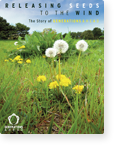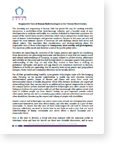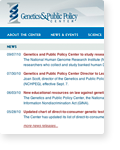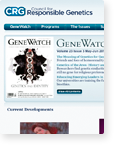Resources
Tools to help you get involved and take action
REPORT
Attitudes Towards and Prevalence of Son Preference and Sex Selection in South Asian American Communities in the United States (PDF)
This report summarizes research conducted by Generations Ahead, a social justice non-profit in the United States, within the South Asian American community. This research examines attitudes towards and prevalence of son preference and sex selective practices through focus groups and interviews with and a survey of South Asian American community advocates in the United States.
REPORT
Releasing Seeds to the Wind: The Story of Generations Ahead (PDF)
Generations Ahead made important progress towards ensuring that diverse voices and perspectives are included in the debates. We hope you take a few minutes to page through and read this report. It not only captures our vision and work, it also includes lessons for the movement that we thought were important to share.
Power Point: Forensic DNA Database Expansion: Growing Racial Inequalities, Eroding Civil Liberties and Diminishing Returns
We hosted an online Webinar to discuss the release of our latest report: Forensic DNA Database Expansion: Growing Racial Inequalities, Eroding Civil Liberties and Diminishing Returns. The report highlights some key issues: growing racial inequalities, eroding civil liberties and diminishing returns.
Statement opposing sex selection bill (HR3541, "PRENDA") (PDF)
“Restricting women’s rights and questioning their decision-making is an utterly misguided approach to promoting gender equality”, said Sujatha Jesudason, Executive Director, Generations Ahead. “Our real challenge is to change the context in which sex selection occurs, and address gender and racial equality issues while protecting the right of all women to make the best reproductive decisions for themselves and their families.”
REPORT
Report: Forensic DNA Database Expansion: Growing Racial Inequalities, Eroding Civil Liberties and Diminishing Returns
The expansion of state and federal DNA databases, inequities in sentencing guidelines, and immigration and drug policy failures, combine to make communities of color disproportionately susceptible to having their DNA collected and retained in a database for the remainder of their lives. This report highlights the issues and offers policy recommendations.
REPORT
Egg Donation Survey
While there is some research about the health risks associated with egg donation and donors satisfaction with the process, very little is known about why women consider donating their eggs, how they make the decision to donate or not, what information they would like to have about the process, and what factors they take into consideration as they decide. This survey is intended to collect and share that information, so that we can better understand what motivates women to donate eggs and what they need throughout the process.
REPORT
Race and Sex in Abortion Debates: The Legislation and the Billboards (PDF)
This report provides an overview of the recent activity in the areas of race and sex selection in abortion fights, and includes analysis of how this issue has evolved and likely trends for the future. We believe that both the legislation and billboards are part of a larger effort by anti-choice groups to improve their public image and appeal to new audiences by claiming that they seek gender equity and racial justice.
REPORT
In The Hot Tub
This article examines the challenges, dilemmas, and strategies in advocacy and policy making on reprogenetics from a social justice and feminist perspective. It is an accounting of the practical strategies that are currently being employed by one organization, Generations Ahead, to build the new alliances needed to ensure that reprogenetics are used in inclusive and just ways.
Position Statement on Sex Selection (PDF)
The use of sex selective technologies reflects and perpetuates gender stereotypes that limit human potential, reinforcing unfortunate social and cultural norms. At Generations Ahead, we believe that changing attitudes and behaviors related to sex selection begins with encouraging prospective parents to ask themselves “What kind of a parent do I want to be?” rather than “What kind of child do I want?”
Position Statement on Legislation Banning Abortion for Reasons of Sex or Race
Generations Ahead is committed to discouraging sex selective practices while protecting access to reproductive health care, including abortion. Our real challenge is to change the context in which sex selection and racial disparities develop, addressing gender and racial equality issues while protecting the right of all women to make the best reproductive decisions for themselves and their families.
LETTER / CALL TO ACTION
Robert Edwards, Virginia Ironside, and the Unnecessary Opposition of Rights (click to sign on)
A statement in support of disability and reproductive rights in abortion and in vitro fertilization – “We hold both disability rights and reproductive rights together, refusing arguments for women’s reproductive autonomy that deny disability rights, and refusing arguments for the human rights of people with disabilities that deny the right of women and families to make the best reproductive decisions for themselves…”
Paradox of Disability in Abortion Debates
If the anti-choice movement has been disingenuous in their portrayal of disability and abortion, the reproductive rights movement has not necessarily lived up to its own highest ideals either. In attempting to highlight the unique decision each woman faces when deciding whether or not to continue with a pregnancy, reproductive rights advocates have often times used language that is unsupportive of disability and families living with disability.
WORKING GROUP
Working Group on Race, Abortion and Sex Selection - RASS
This website brought together resources for reproductive health, rights, and justice advocates to use in preparing for future challenges in the legislature and in the media. Resources included background materials such as fact sheets, legislative summaries, data analyses, PowerPoint slides, state-specific information, information on proposed federal regulation, voluntary professional guidelines, key news articles, a calendar for posting related events and a “toolkit” for organizations seeking to take their own internal positions on sex selection.
All the information in this website was transferred to RH Connect. Once a respected webinar forum for the reproductive rights, health and justice community, it has now evolved into a new secure network where advocates can share, learn and collaborate online. Please direct your inquiries to info@rhconnect.org.
REPORT
A Disability Rights Analysis of Genetic Technologies: Report on a National Convening of Disability Rights Leaders (PDF)
Disability is the most often used justification for the development and use of reproductive genetics yet the voices of disability rights advocates are also the most excluded voices. This report documents the concerns, perspectives and policy priorities of 21 disability rights leaders in the U.S.
TOOLKIT
Taking a Stand: Tools for Action on Sex Selection (PDF)
Taking a Stand is a tool for reproductive rights and justice advocates to use for internal discussions within their organizations to understand the complexities of sex selection. It contains background information about the issue of sex selection, exercises to stimulate debate and policy principles to help build an organizational position on this contested issue.
REPORT
California Forensic DNA Databases: Impacts on Communities of Color (PDF)
A report documenting the voice and perspective of California social justice advocates on DNA forensic databases and the criminal justice system.
REPORT
Bridging the Divide: Disability Rights and Reproductive Rights and Justice Advocates Discussing Genetic Technologies (PDF)
Disability rights and reproductive rights advocates have often been at odds with each other in debates about reproductive genetics. This report documents five roundtable discussions where advocates worked to develop a shared analysis of genetic technologies across movements with the goal of creating common ground and advancing coordinated solutions and policies.
REPORT
A Reproductive Justice Analysis of Genetic Technologies: Report on a National Convening of Women of Color and Indigenous Women (PDF)
To include the leadership and voices of those historically marginalized in reproductive health and rights debates, Generations Ahead convened women of color and Indigenous women leaders from across the U.S. to talk about their concerns and perspectives about socially just uses of genetic technologies.
LETTER / CALL TO ACTION
Bioethical Transparency: Public Participation and Responsible Uses of Human Biotechnologies
Now that restrictions on federal funding for stem cell research have been lifted, it is time to develop a broad and deep dialogue with the American public to determine our shared purpose and conscience with regards to human biotechnologies — when and how we should use these new scientific discoveries.
LETTER / CALL TO ACTION
Responsible Uses of Human Biotechnologies in the Twenty-First Century (PDF)
Community Representation, Public Consultations and Impact Assessments will ensure that intent and impact in the uses of genetic technologies and race are aligned, that multiple stakeholders are invited to participate at every stage, and that the government is engaged with important interest groups regarding critical understandings of humanity, equity, fairness and inclusion.
LETTER / CALL TO ACTION
An evolving landscape: reproductive genetics, new technologies and health care over the next decade (PDF)
Advancements in genetics generally, and in reproductive genetics specifically, bring with them a host of ethical, legal and social concerns that the reproductive health care community will face for years to come.
LETTER / CALL TO ACTION
Facing Forward: The Fate of Race and Genetics in the Twenty-first Century (PDF)
Given the powerful relationship genes have to human understandings of ourselves—who is defined as family and how communities are constituted—unproven and little-tested claims about genetic differences that map onto social categories of race can have profound consequences. This is a call for how to talk about and use the concept of race accurately and responsibly in the context of genetic technologies.
FACT SHEET
The Prenatally and Postnatally Diagnosed Conditions Awareness Act
The Prenatally and Postnatally Diagnosed Conditions Awareness Act (S. 1810) is a positive step toward providing better information and support to pregnant women and new mothers whose fetus or newborn is diagnosed with a disability. This information sheet highlights the Act’s benefits and identifies some of the issues to monitor in its implementation.
WEBSITE
Center for Genetics and Society
The Center for Genetics and Society provides background information and perspectives on a range of genetic technologies and public policies. It is a nonprofit information and public affairs organization working to encourage responsible uses and effective societal governance of the new human genetic and reproductive technologies.
WEBSITE
Genetics and Public Policy Center
The Center helps policy leaders, decision makers, and the public better understand and respond to the challenges and opportunities arising from advances in genetics and their application to human health and well-being.
WEBSITE
Council for Responsible Genetics
The Council for Responsible Genetics works through the media and concerned citizens to distribute accurate information and represent the public interest on emerging issues in biotechnology. It fosters public debate about the social, ethical and environmental implications of genetic technologies and publishes a bimonthly magazine, GeneWatch.
























